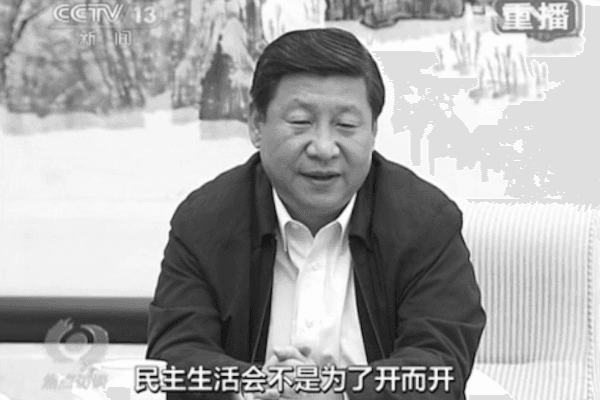Xi Jinping, the head of the Chinese Communist Party, sat at the head of the table with his hands clasped and spoke in quiet, ominous tones: “The meeting isn’t being held for the sake of holding it, or to look good. It’s being held to resolve some problems.”
Problems like corruption, bureaucratism, and abuse of power plague the Party and are the source of immense resentment and discontent by the Chinese people. Xi Jinping has said that he wants to cure the Party of these ills.
No one is sure how he is supposed to affect those changes, but he is making full use of the Party’s toolbox of suppression and indoctrination—a rich set of methods developed over 60 years of communist rule.
Journalists, intellectuals, dissidents, and Internet users have all been targeted, and now Party members are being put under pressure, at least according to the propaganda.
The series of campaigns that Xi has launched in recent months include forbidding the discussion of democracy, suppressing intellectuals, cracking down on “rumors,” launching a “mass line” campaign in the media, and most recently, this campaign of criticism and self-criticism. The practice refers to forced, public confessions of improper thoughts or behaviors, and was heavily used decades ago.
“Criticism and self-criticism are medicines … good medicine is bitter to the mouth,” Xi Jinping remarked during a two day Party conference focused the new campaign, held from Sept. 23–25 in Hebei Province. Xi chaired the meetings, and the event was given extensive coverage by China Central Television, the Party mouthpiece.
Provincial Party Secretary Zhou Benshun led with a self-confession: essentially that he works too hard. “After I came to Hebei, I became attached to reform. I’m afraid of losing face, and I pursue the speed of reform and quantity of work. I also don’t pay much attention to the benefit of the people.”
He then turned around and criticized a colleague, as instructed: “Cadre Qingwei [Zhang Qingwei, the provincial governor] is not patient when listening to others’ advice, which is not a problem of temperament but of bureaucratism. If he doesn’t change, it will be very harmful and he may make mistakes.”
Some of the other cadres seemed under pressure, as the cameras zoomed in on their faces while they confessed their sins to the nation. Only one actually admitted to corruption, while many of the others were like Zhou’s: self-praise disguised as self-confession.
One of the reports was called “If you have something to say, just put it on the table and say it. Resolutely oppose the doctrine of seeking good relations with everyone.” Another was called: “Firmly use the weapon of criticism and self-criticism.”
Following the Hebei activities, video conferences and self-confession sessions were held by cadres around the country.
Xi Jinping saw fit to give the following guidance to Party members: “Even though you’re red in the face and sweating due to nervousness and severity, be encouraged, relaxed, and harmonious.”
One of the pioneering studies of communist techniques of psychological control was done by the psychiatrist Robert Jay Lifton, whose book “Thought Reform and the Psychology of Totalism,” included confessions in a list of criteria for thought reform. “Sins, as defined by the group, are to be confessed either to a personal monitor or publicly to the group. There is no confidentiality; members’ ‘sins,’ ‘attitudes,’ and ‘faults’ are discussed and exploited by the leaders,” Lifton wrote.
Small study groups have also been organized recently, another throwback to Maoist-style indoctrination. The Hunan Provincial Party Committee hosted a session to reflect on the “rectification movement”—also known as a political purge—that took place during the 1940s, a period when the communists were still establishing their mechanisms of control. The gathered Party members then watched a documentary examining the collapse of the Soviet Union, from which they were expected to draw lessons.
The themes in that video echo previous statements by Xi Jinping, who lamented the collapse of the Soviet Union in a secret speech in January. “Why did the Soviet Union disintegrate? Why did the Soviet Communist Party collapse?” Xi is reported to have asked.
He continued: “An important reason was that their ideals and beliefs had been shaken … It’s a profound lesson for us! To dismiss the history of the Soviet Union and the Soviet Communist Party, to dismiss Lenin and Stalin, and to dismiss everything else is to engage in historic nihilism, and it confuses our thoughts and undermines the Party’s organizations on all levels.”
Statements like these, as well as the ramping up of campaigns against popular figures on the Internet, and the harsh repression dished out to intellectuals and dissidents, has deeply troubled many Chinese who were hoping for an administration that was more liberal. Xi Jinping took charge of the Party last November.
“Xi Jinping’s criticism and self-criticism campaign is ridiculous and sad,” commented Hu Ping, the chief editor of the pro-democracy magazine Beijing Spring, via telephone from New York. “It’s a rectification movement. It shows that in Xi Jinping’s mind, there’s nothing but Mao Zedong’s stuff, which is the saddest thing.”
He said that Xi seemed to “worship” Mao’s modus operandi, but added that the approach is out of step with today’s more developed and pluralistic Chinese society.
The idea is also hypocritical, he indicated. “The higher levels criticize the lower levels, and lower levels criticize each other. But the central Party authorities never criticize themselves.”





